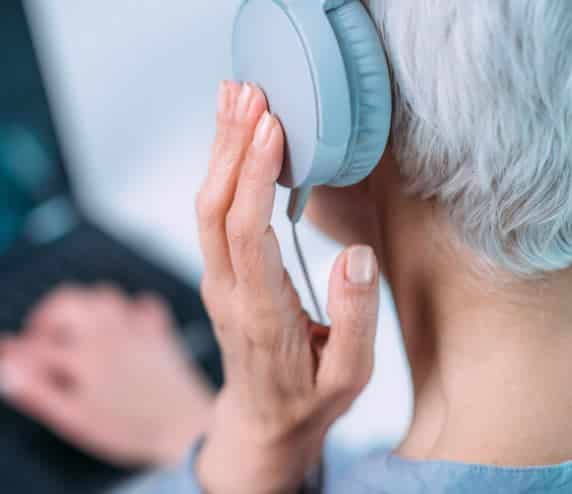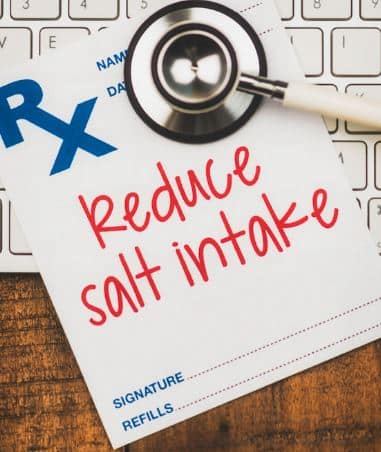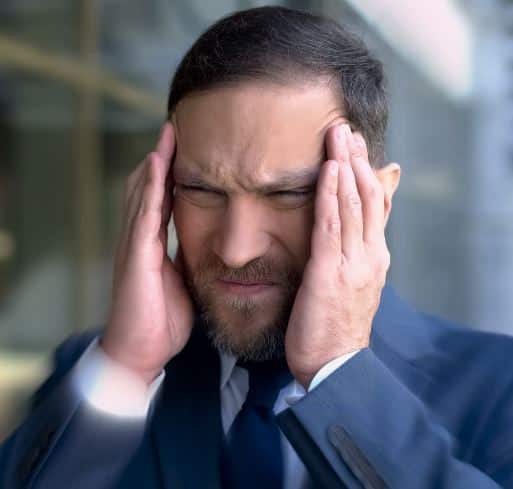This week we have a contribution from Ken Stallons, a Meniere’s patient who also just happens to be an audiologist. I would describe this as an anecdotal report of treatment efficacy, specifically related to salt restrictions as a conservative treatment option for Meniere’s disease. A couple of years ago, I did a multi-part series on the evidence available for the various treatment options for Meniere’s disease, one of which covers salt restricted diets. In that article, I wrote that, despite no firm evidence of benefit, many patients do seem to benefit from salt restriction.
Ken Stallons, MS, CCC-A is one of them. Here is his story (mildly edited as his description of the characteristics of Meniere’s disease are fairly typical and can be found elsewhere).
A NONMEDICAL SOLUTION TO MENIERE’S DISEASE
[A PERSONAL CASE STUDY]
As an audiologist, I thought I had a pretty good understanding of the symptoms that Meniere’s patients would describe and how it was affecting them. I was wrong. On Tuesday, May 6, 2014, I journeyed down the road of dealing with my own Meniere’s situation. Here is my story:
I was at a Minnesota Wild hockey game, watching them beat the Chicago Blackhawks. My first symptoms began as a result of the pre-game buffet. An absolute feast, consisting of duck, prime rib, lobster, wild rice and turkey soup, etc., loaded with sodium. After the game, which was extremely loud, I noticed that my hearing was down, which seemed to affect both ears. The next morning, I noticed that my right ear seemed a bit worse than my left ear. I drove five hours back home, and, as the day wore on, my hearing progressively worsened. At this point, I dismissed the noise exposure as my left ear seemed near normal, and my right ear continued to be affected.
 On Thursday, I immediately tested my own hearing with air and bone conduction. I suspected a virus had caused a sudden hearing loss in my right ear. My ENT physicians put me on 40 mg of prednisone.
On Thursday, I immediately tested my own hearing with air and bone conduction. I suspected a virus had caused a sudden hearing loss in my right ear. My ENT physicians put me on 40 mg of prednisone.
The next day, May 9th, it was a little worse, but by the following Monday, May 12th, it had returned to normal. I gradually reduced the dose of prednisone during the week.
MENIERE’S SYMPTOMS: A FLUCTUATING CONDITION
As I came off of the medication, the hearing in the right ear began getting worse again. After being off the prednisone a couple of days, my right ear was down again. My physicians put me back on the prednisone for the last time, but ordered an MRI and complete blood workup. Again, my hearing improved and the MRI and all of the blood work were completely normal. It occurred to me that the fluctuation was possibly being caused by too much sodium in my diet.
Other symptoms that had been occurring in my right ear only were tinnitus, in the form of a low-frequency roar, and recruitment. I thought that if I had Meniere’s, I would be dizzy, but I wasn’t. My hearing was fluctuating up and down from one day to another, and I was able to verify this fluctuation through a series of audiograms.
The fluctuation became so obvious that I could tell how many decibels my hearing was down from hour to hour. When my hearing would get worse, so would the tinnitus along with the recruitment.
My hearing dropped to 45-50 dB HL, and it became very difficult to function and hear people, even though my left ear was normal. I thought I could get by with normal hearing in one ear, but I really wasn’t able to compensate. My hearing was fluctuating quite a bit.

Hearing aids were not effective, despite numerous adjustments. Once hearing improved somewhat it made a difference.
On two separate occasions, in May and July, I documented changes in my hearing over the course of the day, and found that my thresholds would vary as much as 35 dB HL over a six-hour time frame.
I tried several hearing aids, but nothing really sounded good. The roaring and recruitment made it extremely difficult to achieve much benefit, even though my speech discrimination scores were 100%. It didn’t matter which combination of hearing aid settings I tried. When my hearing improved (25-35 dB HL), the hearing aids actually helped more.
But the improvement would generally last for only for one or two days because my hearing kept fluctuating. When the hearing was at its worst, I actually preferred to have an earplug in my right ear.
LOWERING SODIUM INTAKE
Even though I was not vertiginous, I considered that Meniere’s could be the cause, so I began to learn about low-sodium diets. Opinions vary regarding the proper amount of sodium intake levels for individuals. I Googled some, and found one recommendation that an average person could take in 2850 mg of sodium/day; based on that, a low-sodium intake would be 2000 mg/day. Our local grocery store actually has a nutritionist on staff and has a pamphlet on low-sodium diets. They said an average person can take 2300 mg/day and that a low-sodium diet should not exceed 1500 mg/day.
I decided to limit my daily sodium intake levels to see if they were too high for my body. I started with extremely low levels (500 mg or less), which is lower than recommended levels. I did this, first, to get my hearing back to normal, and secondly, to know what my daily intake could be from this point forward.
As I educated myself about sodium levels, I began to read labels on everything I purchased to eat. I first thought that I would have a very limited number of foods to rely on for snacks. But I discovered on a web site, “101 low sodium snacks” and found quite a variety of snacks on this list, which gave me hope that I could follow a low-sodium diet.
 I began memorizing sodium counts on regular foods. I looked at options for each meal starting with breakfast. Old-fashioned oatmeal has zero sodium, an egg has 80 mg, and a slice of bacon 155 mg; ham is really high. Fruits range from 0-5 mg, and most juices are low, with the exception of tomato juice. There are quite a few differences in brands when comparing things like yogurt and breads and even protein/breakfast bars. Anything processed is higher.
I began memorizing sodium counts on regular foods. I looked at options for each meal starting with breakfast. Old-fashioned oatmeal has zero sodium, an egg has 80 mg, and a slice of bacon 155 mg; ham is really high. Fruits range from 0-5 mg, and most juices are low, with the exception of tomato juice. There are quite a few differences in brands when comparing things like yogurt and breads and even protein/breakfast bars. Anything processed is higher.
The most interesting finding came when I began comparing cheeses. A small 4 oz. serving of cottage cheese has 455 mg of sodium. When comparing sliced cheeses, I found that one slice consists of around 285 mg, with the exception of Swiss cheese, which has only 40 mg/slice. I also found that if I used bruschetta as a condiment, it resulted in half the sodium, as opposed to using ketchup. Low-sodium sections in the grocery stores offer a number of alternatives to foods that we normally consume. Some these options are actually pretty tasty. Two weeks after cutting my sodium levels down, my weight had dropped 10 pounds from 175 to 165 lbs. I attribute this to the loss of water weight.
BACK TO NORMAL…?
Two weeks from my very first symptoms, my hearing was pristine, finally. I felt as if I had found the answer in that the sodium was the only issue. On this particular day, I had consumed only 170 mg of sodium by late afternoon. I left work a little early to go watch my daughter play softball, but I was exhausted and it was hot and I had an hour’s drive ahead. I stopped at Starbucks and got a Vente Frappuccino with an extra shot of espresso (total of 4 shots of espresso). It woke me up, and I had no difficulties driving for the hour.
However, when I stopped and got out of my car, I felt dizzy and staggered into my house. I went and lay down, and focused on something on the wall. The room was not spinning and the object wasn’t moving, but my eyes were. I thought at that moment, I have Meniere’s! I closed my eyes, slept for one hour, woke up still feeling the same, only I became nauseated and got sick. I slept another hour, and woke up with the same results. Then, in a matter of five minutes, I felt normal, and was no longer dizzy.
It was clear that it was the caffeine and not the sodium that had triggered the dizziness. Instead of relying upon caffeine, I began taking a multivitamin pack to help with the lack of energy that I was experiencing. This seem to correlate with reduced sodium intake in my diet. This helped greatly, and I would notice that if I didn’t take the vitamins I would become very fatigued quickly.
Then I wondered, was it just the caffeine, or was it based on having caffeine on an empty stomach, that triggered my dizziness? I believe it was the fact that I consume so much caffeine on a relatively empty stomach. The night before I wrote this article, I had a seven-course meal at a French restaurant with some friends. I finished it off with a stiff single shot cup of espresso.
 It has been four and a half months since my extra espresso shot of dizziness and I did have second thoughts. However, this time it was on a full stomach. I was curious, as I like espresso and I would like to be able to indulge in it. I could always do decaf espresso, but this was a perfect opportunity to test my theory on the caffeine. I’m excited to report that I did not experience any dizziness or any other affects due to drinking the espresso.
It has been four and a half months since my extra espresso shot of dizziness and I did have second thoughts. However, this time it was on a full stomach. I was curious, as I like espresso and I would like to be able to indulge in it. I could always do decaf espresso, but this was a perfect opportunity to test my theory on the caffeine. I’m excited to report that I did not experience any dizziness or any other affects due to drinking the espresso.
Some would argue that this wasn’t a true comparison based on the amount of caffeine consumed, so I decided to do one more experiment. I followed the same pattern as the day I had been dizzy: low sodium, no vitamins and a Vente Frappuccino with an extra shot of espresso in the late afternoon. However, this time, I made sure to eat so that my stomach would be full, right before I consumed the drink. This time I had no nausea, vomiting or dizziness. I had been completely stable, both with my hearing and my balance, for approximately one month, by watching my sodium intake (approximately 800 mg/day).
One Friday night, my wife and I went out to eat and I had a prime rib sandwich Au Jus. I knew that the Au Jus was loaded with sodium, but it was a small ramekin, so I went ahead and dipped. What I didn’t realize was that Au Jus can range from 380-1510 mg of sodium per serving.
By Sunday morning, September 9, my hearing was substantially down (40 dB HL) (Table 1) and stayed that way until Monday night when it improved halfway back to normal. That evening as my hearing improved I actually felt, not quite dizzy but, more of a “disembarkment” syndrome. I literally had to sleep sitting up in bed, otherwise, I would get nauseated. The next morning I was fine.
The other strange symptom that I noticed was that my saliva was very salty tasting as my hearing would improve. My hearing remained the same until two days later, on Wednesday evening, when my hearing returned to normal and was accompanied by a very salty taste in my mouth. Again, I had the “disembarkment” syndrome, and had to sleep sitting up for one night, and then I was fine.
One small ramekin of Au Jus caused all of that misery. This makes me very mindful of what a small menu item like this could do to flare up symptoms in Meniere’s patients. This causes me to educate my Meniere’s patients as their audiologist, on the possible effects that sodium and caffeine could have in their system.
CONTROLLING MENIERE’S – IS IT POSSIBLE?
So the question could be asked, can you control the Meniere symptoms without having to take a diuretic? Personally, from my own case study, I believe the answer is “yes.” However, it is my personal experience that a person must be self-disciplined and very mindful of their sodium intake, on a daily basis. I started out below 500 mg/day and then eased it up to 500-800 mg/day. Currently, I’m functioning comfortably at 800-1000 mg/day.
A diuretic could allow more flexibility, but I feel you would still have to watch your sodium intake. Also, now I regularly drink much more water than I used to, which is something that I would need to do if I take a diuretic. The only real difference seems to a lack of energy, which I have been taking a multivitamin pack to overcome. I will take the multivitamins, and will continue to not take any medication as long as I’m able to control my symptoms. If it gets worse and I can’t control the symptoms, then I’ll take the diuretic.
Managing Meniere’s symptoms without diuretics is possible by closely monitoring sodium intake and making dietary adjustments, as demonstrated in my personal experience.
In summary, I have been able to regulate all of my Meniere’s symptoms completely by modifying my diet. For my body size, it appears that around 1000 mg of sodium a day is appropriate. This could vary for individuals, so I would suggest starting with extremely low-sodium levels (500 mg) and gradually add back as one’s symptoms are controlled. I don’t believe that the recommended dietary levels for a low-sodium diet are quite low enough for people suffering from Meniere’s disease. I no longer consume caffeine in excess, or, more importantly, not on an empty stomach. Many factors affect Meniere’s symptoms, but I believe that limiting sodium and caffeine can help make the symptoms subside, thus making Meniere’s disease both controllable and somewhat easier to manage.
About the author
Ken Stallons attended the University of South Dakota, receiving a Bachelor of Science in Business Administration and Accounting. He received a Master’s in Communication Disorders and Audiology from Southern Illinois University. Ken, a board-certified audiologist, is a member of the American Academy of Audiology and the Nebraska Hearing Society. Ken has served eight years on the Nebraska Hearing Society Board and was President through 2012-2013. He is a past board member of the Iowa Hearing Aid Society. He has been working in the hearing healthcare field since February 1984. He is married and has two children. Ken currently sees patients at the main ENT Specialists, PC clinic location in Omaha.







Ken
I too am an audiologist (retired) and have a similar story. Please email me and let’s talk further.
Larry
I use a combination of diet modification and a diuretic. When I first was diagnosed with Meniere’s I kept my sodium at ~ 500 mg for the first few months. Over the years (I was diagnosed in 2009) I gradually increased it to ~ 1200 mg/day. I have days where I’ll go as high as 2,000 mg, but those are few and far between.
In addition to sodium, I’ve become aware of other “triggers”. Sugar for instance will definitely impact my tinnitus. Lack of sleep will impact my levels of dizziness.
Thankfully, I’ve controlled my symptoms extremely well by watching my diet, taking a diuretic, and taking Acyclovir (per Dr. Gacek’s research).
Funny what you noticed about the caffeine. On occasion I have a half of a cup of decaf coffee in a restaurant. But they usually bring coffee while you’re waiting for the meal, and I find if I drink it before I eat it has a substantial effect on me. If I hold off and have the coffee with my meal I notice very little or no Ménière’s symptoms.
Hi Ken,
Thanks for sharing.
I ‘m a Hearing Instrument Specialst and suffered a SSNHL this summer which returned on its own within 24hrs by the time I saw the ENT . I had one very brief episode a month later only lasting a hour or 2.
The roaring tinnitus (which I now fully understand first hand) was followed almost in sync with the feeling of fullness and lowered hearing .
My thresholds dropped 35-50 db but mainly after 1000Hz with the most noticeable difference at 4K ( not typical of Menieres ). It looked liked a sudden NIHL but I had not been in any exceptionally noisy enviroments. I will only be sent for an MRI if it returns
I too, did not suffer any vertigo or dizziness.
I’m curious if your hearing loss was only in the low Hzs as typical of Menieres.
I suspected then that it could have been an electrolight imbalance as a virus had been ruled out with the return a month later and only being unilateral. Your salt and caffine experience leds me to believe this could have been the case and one I will document if it happens again so thanks for sharing.
Thanks Ken for your informative article. I too, am a sufferer. I have bilateral Menieres diagnosed initially in 1975. When my second (right) ear began having symptoms, it was high piitched tinnitus and HF hearing loss! Crazy. Over time it has flattened out to the typical configuration. The tinnitus began roaring and the dizziness turned into drop attacks. Seems the left ear has burnt out and stabilized. The right ear, however, still acts up at times. So Alison, you are not the only one with the high frequency presentation… As an audiologist myself, I have seen numerous crazy presentations of Ménière’s disease., which I not so fondly refer to as “manures” disease. Haha. Good luck all in managing your symptoms.